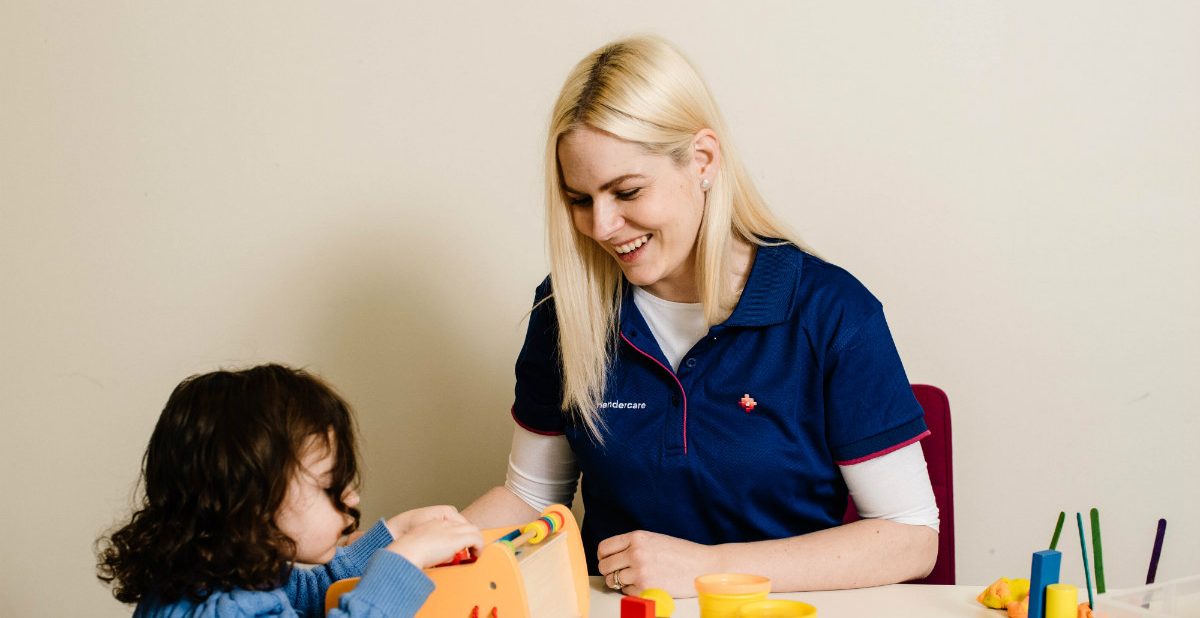
Play as language: understanding play therapy and the benefits for children
By Thomasina Williams, Senior Play Therapist, Hendercare
Play is an entrenched part of childhood and is vital for healthy brain development in children.
In recent years a focus on early intervention programs for children with disabilities has seen the therapeutic approach of play therapy grow in popularity. More than just ‘child’s play’, play therapy provides children living with a disability a chance to uncover their capabilities relating to their disability, strengthen their social relationships and better express, process and master their emotions. With the help of a qualified play therapist, play therapy is an evidence-based approach which can aid in early childhood intervention.
As a developmentally appropriate approach for working with children, play therapy allows a child to ‘play out’ their inner thoughts or real-life experiences. As a child’s linguistic development lags behind their cognitive development, children make sense of their worlds through play and use it to communicate. Play therapists are specially trained in this language and use play to assist children in better expressing and exploring their feelings, needs and behaviours while supporting them to achieve optimal growth and development.
The difference between play therapy and regular play stems from a therapist’s ability to assess, understand and interpret the play. In play therapy the child’s language is play and the toys are their words, a good play therapist will be able to understand and communicate through play leading to a raft of social, emotional, behavioural, and psychological developments for the child.
Some potential outcomes for play therapy include:
- Enhancing and developing relationships, play skills and self-esteem;
- Improving social skills and self-regulation;
- Assisting with processing and expressing emotion, cultivating empathy towards others and reducing anxiety and;
- Aiding the development of new and creative solutions to problems
Many studies support the use of play therapy for children with disabilities, a 2011 study conducted in a special school setting showed children with an intellectual disability (the majority of whom had a secondary diagnosis of autism or developmental delay) experienced measurable improvements by participating in play interventions. Groups involved in the study improved in their overall language skills, behaviour, social skills and goal attainment.
With a range of modalities available under a play therapy approach, parents and caregivers can also benefit from this intervention. Where appropriate, the therapist may involve the parent/caregiver in the therapy and provide them with the tools
to replicate aspects of the therapy at home. This inclusive approach can further support a child with a disability to overcome some of the everyday social, emotional, behavioural or psychological challenges they face.
For parents or caregivers considering play therapy, it is important to be mindful of key criteria to look for when selecting a provider; specifically, the therapist’s qualifications. Currently, there is no minimum qualification to practice as a play therapist, and as a result, some play therapy providers have completed little to no training. It’s essential to ensure when selecting a therapist that they have postgraduate training in play therapy or current registration with a relevant industry body like APPTA (Australasia Pacific Play Therapy Association) or APTA (Australia Play Therapists Association).
Once a play therapist is selected, an initial intake interview occurs with the child’s caregivers, followed by an assessment with the child and/ or their family. With the child’s goals in mind, the therapist will develop a bespoke play therapy program which may be short-term (6-8 weeks), mid-term (8-12 weeks) or long-term (12-24 weeks). The therapist will also consider whether the child would benefit from group or individual sessions to attain their goals. Play therapy sessions are then usually held at the same location and time each week to assist the child in building routine and trust with the therapist.
The key to the success of play therapy as an early intervention lies in selecting a provider who will work with your child and family to recommend and implement the right play modality/modalities to help your child reach their goals. With evidence to support the success of play therapy for children with a disability, it is no surprise that this therapeutic approach, which does not require a referral from a GP or specialist, is gaining popularity amongst the disability sector.
HenderCare is a Registered NDIS Provider established in 2004. Delivering services nationally (excluding NT), they provide a range of support and care services, including play therapy. To find out more, please call 1300 764 433 or visit hendercare.com.au.
1. O’Connor C, Stagnitti K. Play, behaviour, language and social skills: The comparison of a play and a non-play intervention within a specialist school setting. Research in Developmental Disabilities. 2011 Feb 1;32(3):1205-1211.







